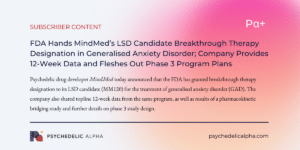A new poll, commissioned by the Canadian Psychedelic Association, has highlighted widespread support for legal access to psilocybin-assisted therapy among Canadians.
The Canadian Psychedelic Association (CPA) has today released data from a telephone survey of over 1,000 Canadian adults. The poll, conducted by Nanos Research, demonstrates public appetite for expanding legal access to psilocybin-assisted psychotherapy for a variety of cohorts.
One of the headline findings is that 82% of Canadians approve the use of psilocybin-assisted therapy for those suffering from an end-of-life illness, a landslide opinion.

The poll also found that only 38% of respondents were aware of psilocybin-assisted psychotherapy, suggesting that public education and awareness campaigns should remain a priority. Interestingly, British Columbia was an outlier in this regard, with 69% of respondents aware of the therapy.
Interestingly, the poll appears to reveal that providing legal routes for certain groups to access psilocybin-assisted psychotherapy is not particularly politically risky, with just 7% of respondents saying that such a move would make them less likely to support a political party. 21%, meanwhile, said it would make them more likely to support a party.
Finally, around two-thirds of Canadians believe that the government should also expand legal access to psilocybin therapy for those who qualify under the Medical Assistance in Dying (MAID) rules.
Buoyed by these findings, the CPA now aims to introduce evidence-informed regulations to Health Canada officials.
***
Growing Calls for Health Canada to Review Psilocybin Access
Despite a number of progressive moves by Health Canada—such as the granting of Section 56 exemptions to predominantly palliative individuals and a notice of intent to amend the Special Access Program to include psychedelics—many groups believe the Department must do more.
Canadian non-profit TheraPsil, which facilitated many of the Section 56 exemptions that have thus far allowed dozens of individuals to access psilocybin-assisted therapy legally, is now challenging Minister of Health Patty Hajdu to end the 50-year prohibition on magic mushrooms.
A spokesperson from TheraPsil told Psilocybin Alpha that just 34 Canadians have benefited from Section 56 exemptions, which do not represent a sustainable path for access to psilocybin therapy. The spokesperson also implied that the granting of these exemptions is somewhat arbitrary, and perhaps even discriminatory.
The CPA certainly seems to agree, noting in their press release that, “members of the medical and legal communities in Canada believe that such steps still leave too many Canadians with undue depression, anxiety and mental anguish, particularly Canadians in palliative care of at end-of-life.”
Seeking to capitalize on an apparently propitious public mood, the CPA announced a ‘Memorandum of Regulatory Approval’ (MORA), the product of 10 months of discussion with a variety of stakeholders. Cory Firth, Executive Director of the CPA, explained:
“The MORA was prepared by some of the best researchers, industry, legal and regulatory experts in Canada. As the voice of psychedelics in Canada we made sure that no stone was left unturned in our efforts to bring timely and effective regulatory change to Canadians at end-of-life and suffering from various treatment-resistant mental health conditions.”
Field Trip’s Ronan Levy, a CPA member, described the MORA as forwarding a “well-considered, balanced approach,” adding that “cost-benefit analysis strongly favours prompt access to psychedelic therapies.”
***
CPA Poll Builds on Existing Public Opinion Data
This isn’t the first poll suggesting widespread support for changes to psilocybin regulations. In fact, we have already seen two promising psilocybin-related polls released this summer.
TheraPsil commissioned YouGov to conduct a poll of Canadians, with a slightly broader focus. The survey asked just over a thousand Canadians whether they support or oppose changes to regulations that would see it become medically available to Canadians, where an individual’s doctor supports its use.

The poll found that 54% of Canadians supported changes to psilocybin regulations, a number that increased to 66% when respondents were informed about research into psilocybin’s potential therapeutic benefits and the section 56 exemptions that had been granted thus far.
Elsewhere, a poll conducted by DrugScience and Psilonautica found a majority of Brits support changes to the law to allow terminally ill patients access to psilocybin therapy.

***
The Road to New Regulations
As aforementioned, the CPA is not alone in proposing new regulations surrounding the possession and use of psychedelics such as psilocybin.
TheraPsil is forwarding its own recommendations and potential legal challenges, and MAPS is also sketching regulatory plans that it hopes Health Canada will consider.
These non-profits are now poised to leverage these datasets to push for more substantial regulatory and legislative changes to expand access to psilocybin-assisted psychotherapy for those in need.






